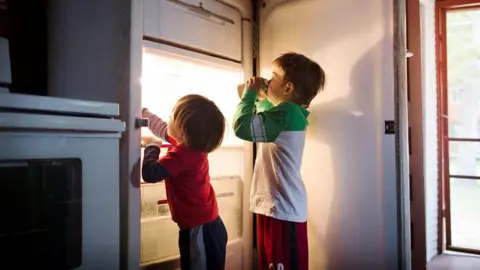Children living in 'Dickensian' poverty, commissioner warns
 Getty Images
Getty ImagesSome children are living in "Dickensian" levels of poverty, according to England's children's commissioner.
In a report published on Tuesday, Dame Rachel de Souza said children have described living in homes with rats, seeing bacon as a luxury food and not having a place to wash.
She insisted the government should scrap the two-child benefit cap, which stops most families from claiming means-tested benefits for any third or additional children born after April 2017.
A spokesperson for the government said it was "determined to bring down child poverty" and had announced a £1bn package to improve crisis support, including funding to ensure the poorest children do not go hungry outside term time.
The new report, which was commissioned by the government and is based on the experiences of 128 children across the country between January and March this year, noted a range of concerns - including lack of access to quality, healthy food and living in cramped and poor conditions.
The children's commissioners for the UK's four nations - including Dame Rachel - have called for two urgent actions to address what they call the "root causes of poverty" - removing the two-child benefit cap and an annual increase in all child-related benefits.
In a joint statement, they called on the government to "act with urgency, because children cannot afford to wait". They added that it was "unacceptable" in 2025 that any child is going without basics like food, clothing, heating, safe housing and other essentials.
Speaking on BBC Breakfast on Tuesday as her office published the report, Dame Rachel said she had been doing the job for four years but was shocked "by how much worse things have got."
"It really is Dickensian and there are a huge number of children now who have dropped below what anyone of us would think is reasonable," she continued.
"The children who have got no food to eat, the children who can't wash their clothes so they are going to school dirty and if they're lucky the school are washing their clothes for them.
"I had one child tell me about his shame because he couldn't have his friends round because in the night rats came and bit his face."
Labour MP Dame Meg Hillier, who is chair of the Treasury Select Committee, told the BBC Radio 4's Today programme that she is not surprised about what the report has found.
She said she was seeing people in her constituency every week who were living in cramped and unsanitary conditions.
"I visited a man working in a good job, three children and his wife in a one-bedroom flat – so five of them in one bedroom. When the baby's ill they have to go and sleep in the small living room," said Dame Meg.
The new report is aimed at helping the government as it works on a child poverty strategy, which is due to be delivered in the autumn. Its child poverty taskforce is looking at the case for removing the cap, among other policy options.
A spokesperson for the government said the "ambitious" strategy would help ensure the government delivers "fully-funded measures that tackle the structural and root causes of child poverty across the country".
The Institute for Fiscal Studies think tank estimates that axing the two-child benefit cap would cost the government about £3.4bn a year and lift 500,000 children out of poverty.
About 1.6 million children live in households affected by the cap, according to the Department for Work and Pensions.
Lynn Perry, chief executive of the children's charity Barnardo's, said on Tuesday that the impacts of poverty on children's health was being seen across the UK.
"The NHS is seeing the return of diseases like rickets due to malnutrition – the very same illnesses tackled by our founder Thomas Barnardo more than 150 years ago."
It is also calling for the two-child limit and other benefit caps to be scrapped.
The Labour government had been considering lifting the limit, but at the weekend the education secretary - who co-leads the child poverty taskforce - refused to commit to doing so.
Bridget Phillipson said ministers were "looking at every lever" to lift children out of poverty - but that spending decisions have now been made "harder" after the government axed other proposed benefits changes which would have saved billions.
Dame Meg Hillier was among those who recently made attempts to try to stop the government's welfare reforms. When it was put to her that the scrapping of the proposed changes mean it is now not possible for the government to lift the two-child benefit cap due to a lack of funds, she replied: "We shouldn't be seeing it as a trade-off."
The Liberal Democrats, the Green Party, Reform, the SNP and Plaid Cyrmu have all called for the cap to be removed.
Conservative shadow chancellor Mel Stride, meanwhile, has defended the policy, which was introduced by his party in 2017.
"A lot of people up and down the country go through those hard choices and often sacrifices, in order to have a large family," he recently told the BBC.
